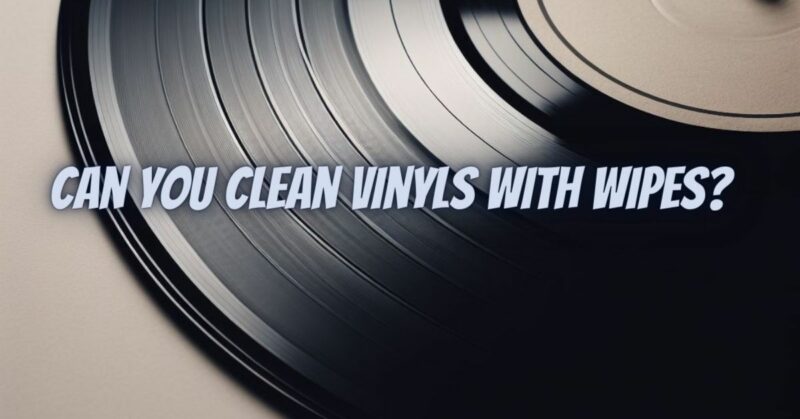Vinyl records have experienced a resurgence in popularity, offering music enthusiasts a tactile and nostalgic way to enjoy music. To maintain the pristine condition of your vinyl collection and ensure a high-quality listening experience, regular cleaning is essential. While many methods and cleaning solutions are available, some people wonder whether vinyl records can be effectively cleaned with wipes. In this comprehensive guide, we will explore the use of wipes for cleaning vinyl records, including the benefits, potential drawbacks, and best practices to help you make informed decisions about preserving your cherished vinyl collection.
The Importance of Cleaning Vinyl Records
Vinyl records are susceptible to accumulating dust, dirt, oils, and contaminants that can affect audio fidelity and overall listening pleasure. Regular cleaning is essential to prevent these contaminants from settling into the grooves, leading to surface noise, pops, and clicks during playback. Properly cleaned records not only sound better but also last longer.
Using Wipes for Vinyl Record Cleaning
Wipes, such as microfiber cloths, are a convenient and readily available option for cleaning vinyl records. However, it’s crucial to understand how to use them effectively and consider their advantages and disadvantages:
Benefits:
- Convenience: Wipes are easy to access and use, making them a convenient choice for quick cleaning sessions.
- Gentle Cleaning: Microfiber and other soft, lint-free wipes provide a gentle and non-abrasive way to remove surface dust and contaminants from vinyl records.
- Portability: Wipes are portable and suitable for on-the-go cleaning, making them useful for DJs, record collectors, and audiophiles who travel with their vinyl.
Drawbacks:
- Limited Cleaning: Wipes are most effective for surface cleaning and dust removal. They may not address deeper contaminants or issues like mold or mildew.
- Potential Static Buildup: Some wipes, especially those made from synthetic materials, can generate static electricity when used on vinyl records. This static can attract more dust and debris after cleaning.
- Residue: Depending on the type of wipe and any cleaning solutions used, residue may be left behind on the record surface, potentially affecting playback.
- Risk of Scratching: If not handled properly, wipes can potentially scratch the surface of vinyl records, especially if abrasive materials are used.
Best Practices for Cleaning Vinyl Records with Wipes
If you choose to use wipes for cleaning vinyl records, it’s essential to follow best practices to ensure effective cleaning without causing damage:
- Choose the Right Wipes: Opt for soft, lint-free wipes made from microfiber or other non-abrasive materials. Avoid wipes that may leave lint or fibers behind.
- Avoid Alcohol-Based Wipes: Avoid using wipes or cleaning solutions containing alcohol or harsh chemicals, as these can damage vinyl records.
- Use Distilled Water: If you need moisture to aid in cleaning, use distilled water, which is free from minerals that can leave residue.
- Wipe in a Circular Motion: Gently wipe the record’s surface in a circular motion, following the grooves. Apply minimal pressure to avoid potential scratching.
- Wipe in One Direction: Always wipe in the direction of the grooves to minimize the risk of pushing contaminants deeper into the grooves.
- Change Wipes When Dirty: Replace the wipe or clean it thoroughly when it becomes dirty to prevent reintroducing contaminants.
- Avoid Excessive Moisture: Do not oversaturate the wipe with moisture to prevent excess liquid from seeping into the label or record jacket.
- Use an Anti-Static Brush: To reduce the risk of static buildup, consider using an anti-static brush or gun before and after wiping.
Wipes, particularly microfiber cloths and soft, lint-free materials, can be effective for surface cleaning and dust removal from vinyl records. They offer convenience and portability, making them a practical choice for quick cleaning sessions. However, it’s important to recognize the limitations of wipes and exercise caution to avoid potential issues such as static buildup, residue, and scratching.
While wipes can be part of your vinyl record cleaning toolkit, it’s advisable to use them in conjunction with more thorough cleaning methods for deep cleaning and maintenance. Depending on the condition of your records and your preferences, consider using a dedicated record cleaning solution, a record cleaning machine, or other specialized cleaning tools for a more comprehensive and effective cleaning regimen. Ultimately, proper care and attention to cleaning practices will help you preserve the sound quality and longevity of your cherished vinyl collection.


